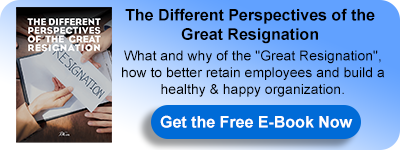What Are Employees Seeking Post COVID-19?
After the great resignation hit organizations worldwide, employers started to ask employees about their needs and what would make them choose one company over the other. Some organizations are keen on maintaining employees well being, and retaining talents.
As for employees, their answers convey their need for care and understanding. They would prefer an organization that empathizes with them and the new normal they and their employers have suddenly struggled to maneuver. Among the most basic needs:
Flexibility
According to McKinsey data, most employees desire to work from home three days a week under that hybrid model. And if those requirements aren't satisfied, those workers are ready to leave. More than a fifth of those polled indicated they'd consider changing jobs if their company went back to doing everything on-site.
Inclusion
Employee wellbeing and productivity are boosted by high-level communication about post-COVID-19 working arrangements. Organizations that communicate more specific, remote-relevant policies and practices, on the other hand, find more significant gains.
Employees who feel more involved in clear communication are nearly five times more likely to report higher productivity. Leaders should consider increasing the frequency of their staff updates to share what has already been determined and explain what is still uncertain because communicating about the future can drive performance outcomes today.
Work-Life Balance
According to a McKinsey survey, more than half of employees prefer more flexible, hybrid virtual-working arrangements, in which people work on-premises and remotely at times.
According to the paper, "a hybrid strategy can help organizations make the most of talent wherever it sits." It can "reduce expenses and strengthen organizational performance" simultaneously.
Decreasing Anxiety At Work
Nearly half of employees in firms that are communicating loosely or not at all about the future of post-pandemic work say it is causing them stress or anxiety. Anxiety is recognized to harm work performance, job satisfaction, and interpersonal connections with coworkers, among other things. The cost of lost production due to poor mental health, such as worry, might be as much as $1 trillion per year for the global economy.
Clear Vision
Many participants said that a lack of clarity made them feel uneasy, thus having solid, understood policies and conveying them properly was also vital.
More than a third of respondents listed clear hours and expectations for collaboration among the top-five policies. Collaboration tools and reimbursement for remote work office setups received high marks as well.
1 WEFORUM, 7 May 2021, Emma Charlton, Four things employees want implemented by their bosses post pandemic, Accessed 20 Dec 2021, https://www.weforum.org/agenda/2021/05/employers-pandemic-covid-19-mental-health/>
Mckinsey, 1 Apr 2021, Andrea Alexander, Aaron De Smet, Meredith Langstaff, and Dan Ravid, What employees are saying about the future of remote work?, Accessed 20 Dec 2021, < https://www.mckinsey.com/business-functions/people-and-organizational-performance/our-insights/what-employees-are-saying-about-the-future-of-remote-work
For more about this topic, download our latest book " The Different Perspectives of the Great Resignation " for FREE:
